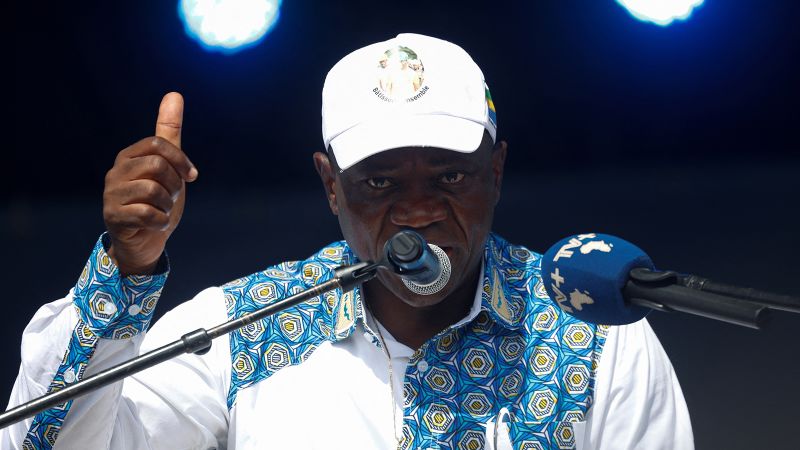Gabon's Post-Coup Election: Ali Bongo's Ouster and the Rise of General Brice Oligui Nguema
Gabon's political landscape dramatically shifted following the military coup in August 2023, culminating in the ousting of long-time President Ali Bongo Ondimba and the subsequent installation of General Brice Oligui Nguema as the interim president. This unprecedented event has sparked intense international scrutiny and raised critical questions about Gabon's future trajectory. This article delves into the intricacies of the post-coup scenario, analyzing the implications of the election, the challenges facing the new leadership, and the potential paths forward for this central African nation.
The Coup and its Aftermath: A Power Vacuum Filled
The military coup, led by a group of senior officers, effectively ended Ali Bongo Ondimba's 14-year rule. The justification cited by the coup leaders centered around accusations of electoral irregularities in the recently concluded presidential election, a claim that remains contested. The swiftness and relative lack of bloodshed during the coup surprised many observers, though concerns remain regarding the long-term stability of the nation.
The immediate aftermath witnessed a period of uncertainty. International condemnation was swift, with many countries calling for the reinstatement of constitutional order and the release of Ali Bongo Ondimba, who was placed under house arrest. However, the military junta's consolidation of power proceeded relatively smoothly, leading to the appointment of General Brice Oligui Nguema as the transitional president.
General Brice Oligui Nguema: The New Leader and His Challenges
General Oligui Nguema's ascension marks a pivotal moment in Gabonese history. While he has pledged a return to constitutional order, the timeline and specifics remain unclear. He faces a multitude of formidable challenges:
-
Economic Instability: Gabon's economy, heavily reliant on oil revenues, has been facing significant headwinds in recent years. The coup has further exacerbated economic uncertainty, potentially leading to capital flight and hindering foreign investment. Diversifying the economy and implementing sustainable economic policies will be crucial for his success.
-
International Relations: The coup has damaged Gabon's international standing. Restoring trust with international partners and securing crucial aid and investment will require significant diplomatic efforts. Navigating relationships with regional powers and international organizations will be paramount.
-
Constitutional Reform: The junta's commitment to a return to constitutional order remains a key focus. However, the specifics of the transitional government's mandate and the process for organizing future elections require careful consideration. Balancing the needs for stability and democratic reform will be a delicate act.
-
Social Unrest: Despite the relatively peaceful nature of the coup, underlying social and economic tensions persist. Addressing these issues and fostering national unity will be vital to prevent further instability. Effective communication and engagement with civil society will be critical in this regard.
-
Combating Corruption: Gabon has a long history of allegations of corruption and mismanagement. Addressing these issues and promoting transparency and accountability in governance will be essential for restoring public trust.
The Path Forward: A Balancing Act
The long-term success of Gabon's post-coup transition hinges on a delicate balancing act. General Oligui Nguema's administration needs to navigate the immediate challenges while paving the way for a credible return to democratic governance. Key elements for success include:
-
Transparency and Accountability: Open communication, inclusive dialogue, and transparent governance are essential to rebuild trust with the Gabonese people and the international community.
-
Economic Reform: Diversification of the economy, investment in human capital, and sustainable development initiatives are crucial to ensuring long-term economic stability and prosperity.
-
Strengthening Institutions: Independent and impartial institutions, including a fair and independent judiciary, are essential for a functioning democracy.
Conclusion:
The coup in Gabon presents both risks and opportunities. The path forward will require careful navigation of complex political, economic, and social challenges. General Oligui Nguema's ability to manage these challenges, foster national unity, and ensure a timely and credible return to constitutional rule will ultimately determine the success of Gabon's post-coup transition. The international community's role in supporting this process, while upholding democratic principles, remains crucial. The coming months will be critical in shaping the future of this central African nation.
